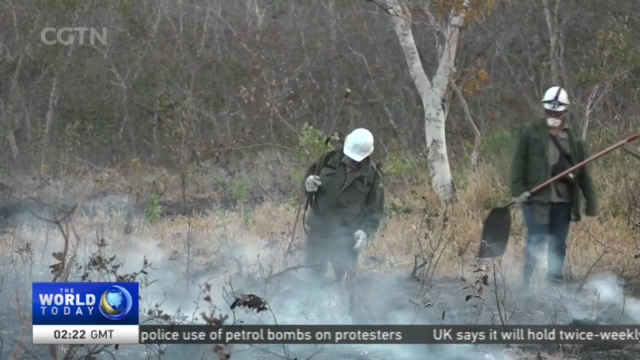
11:59, 30-Aug-2019
Bolivia Fires: About 12,000 square kilometers of forest and grassland destroyed
Updated
13:11, 30-Aug-2019

Bolivia's government says fires have destroyed some twelve thousand square kilometers of forest and grassland in the country. Environmentalists say the real figure is higher, and blame the government of President Evo Morales. CGTN's Dan Collyns reports from the fire-affected zone.
Bolivia is still burning.
This team goes from place to place, making sure even the embers of the fire are fully extinguished.
It's painstaking work to ensure there's no chance of the fire starting again.
RUNY CALLAU FIREFIGHTER CAPTAIN "I think we're starting to beat this fire, we don't think this fire started naturally and it should be investigated."
They work at night because it's cooler and easier to see the flames and put them out.
Much of the team is made up of volunteers like Olivia Mansilla.
OLIVIA MANSILLA VOLUNTEER "I was motivated by desperation, what we're seeing is so serious! What we're doing to Bolivia and the Amazon is something that can't be fixed even if we put out the fire now, what comes next will be a holocaust."
The army has also been drafted in to help stamp out the flames and neighboring countries like Peru, Chile and Argentina have sent logistical support.
DAN COLLYNS TAPERAS, BOLIVIA "Donations of food and water are now mainly being used for volunteers and firefighters who are still tackling the remaining blazes. outlying areas have been affected, but the authorities here say that the human cost can be overcome, the real and long-lasting impact is for the ecosystem."
Environmental groups say some 1.8 million hectares of mostly dry forest went up in flames across Bolivia.
They blame President Evo Morales for incentivizing slash and burn practices to expand pasturelands for cattle.
But his government says strong winds in tinder dry conditions.
GERMAIN CABALLERO MAYOR, SAN JOS DE CHIQUITO, BOLIVIA "The peasant and indigenous communities are not in desperate need, most of all we're worried about the environmental damage, this attack on our natural resources, on the biodiversity and ecosystem here. Deep down that's what worries us most."
After nearly a month of fires, firefighters are bringing the blaze under control. But environmentalists are saying that the damage to sensitive wildlife habitants has been done.
Dan Collyns, CGTN, in Tapare, Bolivia.
SITEMAP
Copyright © 2018 CGTN. Beijing ICP prepared NO.16065310-3
Copyright © 2018 CGTN. Beijing ICP prepared NO.16065310-3